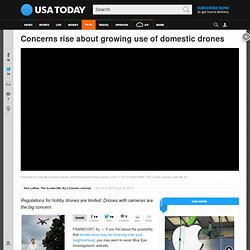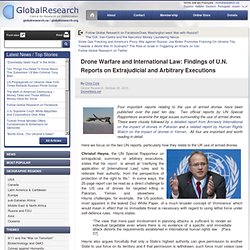

Drone Threats: US Should Wake Up. Can state laws protect you from being watched by drones? For most of the public, the word "drone" calls up the sleek, automated killing machines that the Obama administration routinely deploys against suspected terrorists and that Rand Paul (R-Ky.) filibustered on the floor of the Senate.

But those aren't the only drones around. Because drones are cheap, light and don't require a pilot, they can be put in the air for a fraction of the cost of a traditional airplane. That has created new opportunities for everyone from real estate firms to oil and gas companies to PETA -- anyone, in fact, who might have use for an eye-in-the-sky, but doesn't have the money to hire a pilot and a plane. But the dawning era of cheap, private surveillance is leading a lot of states to ask how these private drones should be regulated. Animal rights groups, for example, have announced plans to use drones to monitor farms for cruelty to animals. A Primer on Domestic Drones: Legal, Policy, and Privacy Implications. La-na-nn-faa-domestic-drone-rules-20131107,0,7287135. WASHINGTON – The Federal Aviation Administration released what it called a road map Thursday that sets the stage for law enforcement agencies, businesses, universities and hobbyists to fly remotely piloted aircraft, better known as drones, inside the United States by 2015.

The 74-page document was criticized by some privacy advocates, who say the FAA needs to clarify how the government and private users can use video and other data from the unarmed surveillance drones, and how long it can be stored. Michael P. Huerta, the FAA administrator, estimated that 7,500 small drones could be flying in U.S. skies within five years if regulations are written on schedule. He said the chief concern is writing requirements for drone design and pilot training to prevent unmanned planes from colliding with other aircraft. “We have operational goals and safety issues we need to consider as we expand the use of unmanned aircraft,” Huerta told an aerospace conference Thursday in Washington. Domestic Drone Information Center. Lawmakers move to limit domestic drones. Drones are coming to a police station near you, prompting lawmakers to craft legislation designed to limit what they see as the potential for a previously unthinkable level of Big Brother-style surveillance by the government.
Four states - Florida, Idaho, Montana and Virginia - have already passed laws to control the use of drones by law enforcement. The first three have barred police from using drones without a warrant in most cases; Virginia has barred their use by law enforcement (with exceptions) for two years. According to a tally by the American Civil Liberties Union, legislation to limit drone use has been proposed in 41 states and remains active in 32 states.
There is also a push to limit domestic drone use on a federal level. Concerns rise about growing use of domestic drones. FRANKFORT, Ky. — If you fret about the possibility that drones soon may be hovering over your neighborhood, you may want to avoid Blue Eye Investigations' website.

Under a headline touting it as "authorized to operate aerial drone surveillance," is a photo of Blue Eye's eye-in-the-sky — which looks like a large, mechanical spider lifted by four rotor blades, carrying a video camera under a glass dome. STORY: Big drone makes historic landingSTORY: FBI uses drones in USA, Mueller says Richard Travelstead, owner of Blue Eye in Louisville, Ky., confesses that his site's message contains what he calls a bit of marketing, given that no one authorized him to use his drone.
Rights groups say Obama's drone program violates international law. Two new reports on the use of drones by the United States in its ongoing war against Al-Qaeda add to a growing chorus of concern among human-rights groups that the Obama administration's drone program has violated international law and caused unnecessary civilian deaths, fear and chaos in Pakistan and Yemen.

One report, released by Amnesty International, reviews 45 drone strikes in North Waziristan and surrounding regions in Pakistan in 2012 and 2013. The area is considered a hotbed of Al-Qaeda activity and is the most targeted location in the world for drone strikes. Domestic Drones. U.S. law enforcement is greatly expanding its use of domestic drones for surveillance.

Routine aerial surveillance would profoundly change the character of public life in America. Rules must be put in place to ensure that we can enjoy the benefits of this new technology without bringing us closer to a “surveillance society” in which our every move is monitored, tracked, recorded, and scrutinized by the government. Drone manufacturers are also considering offering police the option of arming these remote-controlled aircraft with (nonlethal for now) weapons like rubber bullets, Tasers, and tear gas. Read the ACLU’s full report on domestic drones here. Numerous states are considering (and some have passed) legislation regulating the use of drones. USAGE LIMITS: Drones should be deployed by law enforcement only with a warrant, in an emergency, or when there are specific and articulable grounds to believe that the drone will collect evidence relating to a specific criminal act. U.S. broke international law by killing civilians with drones: rights groups.
Drone Warfare and International Law: Findings of U.N. Reports on Extrajudicial and Arbitrary Executions. Four important reports relating to the use of armed drones have been published over the past ten day.

Two official reports by UN Special Rapporteurs examine the legal issues surrounding the use of armed drones. These were closely followed by a detailed report from Amnesty International on the impact of drones in Pakistan and a related report by Human Rights Watch on the impact of drones in Yemen. All four are important and worth reading in detail. Here we focus on the two UN reports, particularly how they relate to the UK use of armed drones. Unmanned Flight: The Drones Come Home. At the edge of a stubbly, dried-out alfalfa field outside Grand Junction, Colorado, Deputy Sheriff Derek Johnson, a stocky young man with a buzz cut, squints at a speck crawling across the brilliant, hazy sky.

It’s not a vulture or crow but a Falcon—a new brand of unmanned aerial vehicle, or drone, and Johnson is flying it. The sheriff ’s office here in Mesa County, a plateau of farms and ranches corralled by bone-hued mountains, is weighing the Falcon’s potential for spotting lost hikers and criminals on the lam. A laptop on a table in front of Johnson shows the drone’s flickering images of a nearby highway. Standing behind Johnson, watching him watch the Falcon, is its designer, Chris Miser.
Rock-jawed, arms crossed, sunglasses pushed atop his shaved head, Miser is a former Air Force captain who worked on military drones before quitting in 2007 to found his own company in Aurora, Colorado. The Falcon can fly for an hour, and it’s easy to operate. Mike Rogers Defends Drone Killing Of Pakistani Taliban Leader. WASHINGTON, Nov 3 (Reuters) - A U.S. lawmaker whose committee oversees the intelligence community on Sunday defended the drone strike that killed a Pakistani Taliban leader and said it would help keep American troops safe.

Representative Mike Rogers, who chairs the House of Representatives' permanent intelligence committee, said the slain militant, Hakimullah Mehsud, was a "bad guy" who was connected to attacks against Pakistani soldiers and to the Taliban in Afghanistan, which has forced closures of many schools for girls. "This was a bad guy," Rogers said on CBS' "Face the Nation. " "There's some information recently that concerned us about the safety of our troops.
I feel a little better for our troops today than I did before this event happened. " The morality of drone warfare revisited. In the contentious debate over drone warfare, it is necessary to separate US government policy from the broader moral question of killing by aerial robots.

The policy question deserves vigorous debate by legal scholars, policy experts, and diplomats. The moral question posed by this new form of remote warfare is more abstract and has only recently begun to receive critical examination by philosophers and ethicists. The Guardian has attempted to feature the distinct moral and philosophical side of this issue, and a recent story profiled my own views on the topic. Unfortunately – if understandably, given the complexities of the matter – I consider some of my views were misrepresented. Most disturbingly, I was reported to claim that "there's no downside" to killing by drones. My view is this: drones can be a morally preferable weapon of war if they are capable of being more discriminate than other weapons that are less precise and expose their operators to greater risk.
Drone strikes killing more civilians than U.S. admits, human rights groups say. In Pakistan, Amnesty International investigated nine suspected U.S. drone strikes that occurred between May 2012 and July 2013 in the territory of North Waziristan.

The group said it found strong evidence that more than 30 civilians were killed in four of the attacks. The basic circumstances of each of the drone strikes had been previously reported by local and international news outlets. But the human rights groups said they were able to shed further light on the incidents by interviewing survivors, other witnesses and government officials in both countries. Most drone strikes in Pakistan and Yemen occur in remote areas that are often hostile to outsiders, making independent assessments difficult.
Living Under Drones. US officials rarely mention civilian casualties by US drone strikes. When they do, they generally offer extremely low estimates in the “single digits.”[1] It is very difficult–given the opaqueness of the US government about its targeted killing program, and the obstacles currently faced by independent observers investigating on the ground–to determine precisely the total number of individuals killed, let alone the number of civilians who have been killed or injured in drone strikes in Pakistan. Yet the numbers of civilians killed are undoubtedly far higher than the few claimed by US officials. U.S. drone killing of American al-Awlaki prompts legal, moral debate. NEW: "You do not kill people without warning in non-battlefield situations," law expert saysNEW: "If you're a terrorist, you're a terrorist," Defense Secretary Panetta saysPresident Obama defends killing as "a major blow" against al QaedaTerrorists don't have access to U.S. courts, analyst says (CNN) -- The U.S. drone killing of American-born and -raised Muslim cleric Anwar al-Awlaki, a major figure in al Qaeda in the Arabian Peninsula, has re-energized a national debate over the legal and moral quandaries of a government deliberately killing a citizen.
The issue has been roiling throughout the U.S. campaign against terrorism, but Friday's drone missile killing of al-Awlaki and a second American, Samir Khan, provided a stark, concrete case of a U.S. policy that authorizes death for terrorists, even when they're Americans, analysts said. A government source who was briefed Friday morning by the CIA confirmed the U.S. missile strike, which killed two other people in a car in Yemen. The Strategic Effects of a Lethal Drones Policy. Understanding drones in a broader context. “America’s Drone Campaign is Both Moral and Effective” Add to Calendar > Bug splats. That’s what the American operators of drones, sitting in safety thousands of miles away, call the casualties of a drone attack in Pakistan or Yemen. Why bug splats? Everything you need to know about the drone debate, in one FAQ. This is well outside Wonkblog's normal bailiwick, but if nothing else, Sen.
Rand Paul's (R-Ky.) filibuster against CIA director nominee John Brennan — launched as a protest against the administration's drone policy, which Brennan has steered for the past four years — uncovered a hunger for a broader conversation on the topic. So what does the drone program actually entail, and why are Paul and others criticizing it? Etzioni_DroneDebate. US defends drone strikes as 'necessary and just' in face of UN criticism. A progressive defense of drones.
Is U.S. being transparent enough about civilian deaths from drone strikes? GWEN IFILL: Now we return to what two human rights groups are reporting about U.S. strikes abroad.